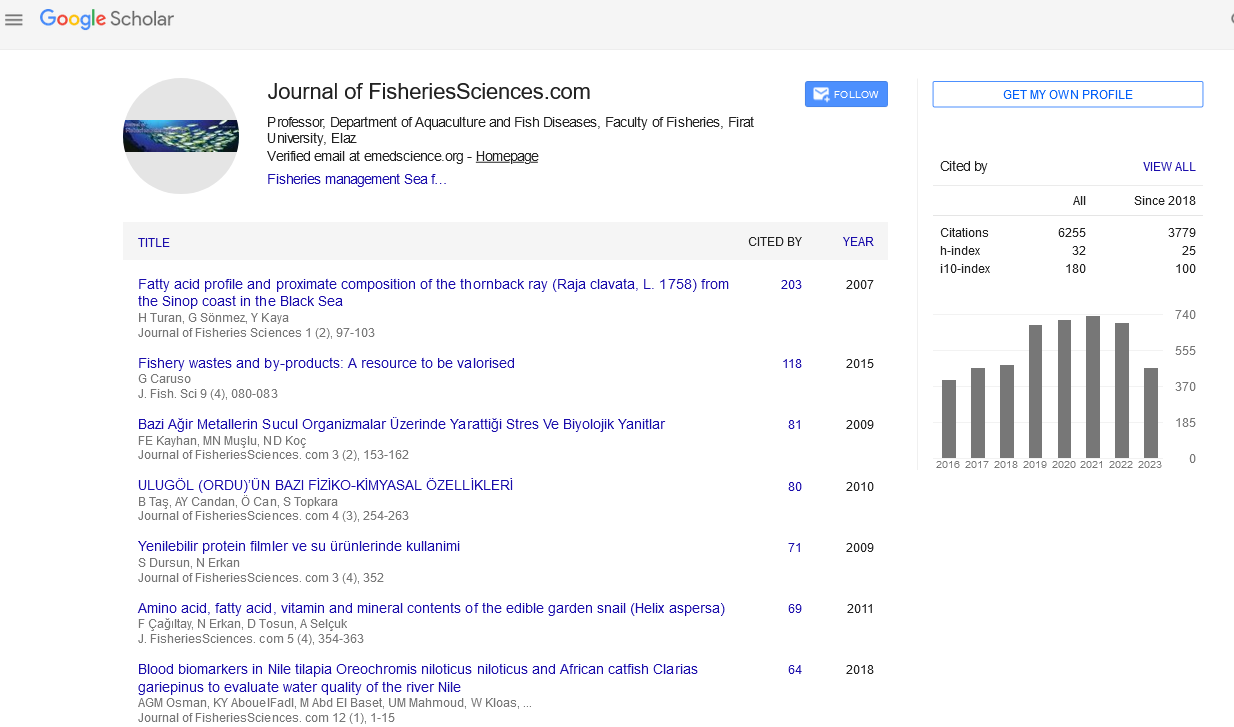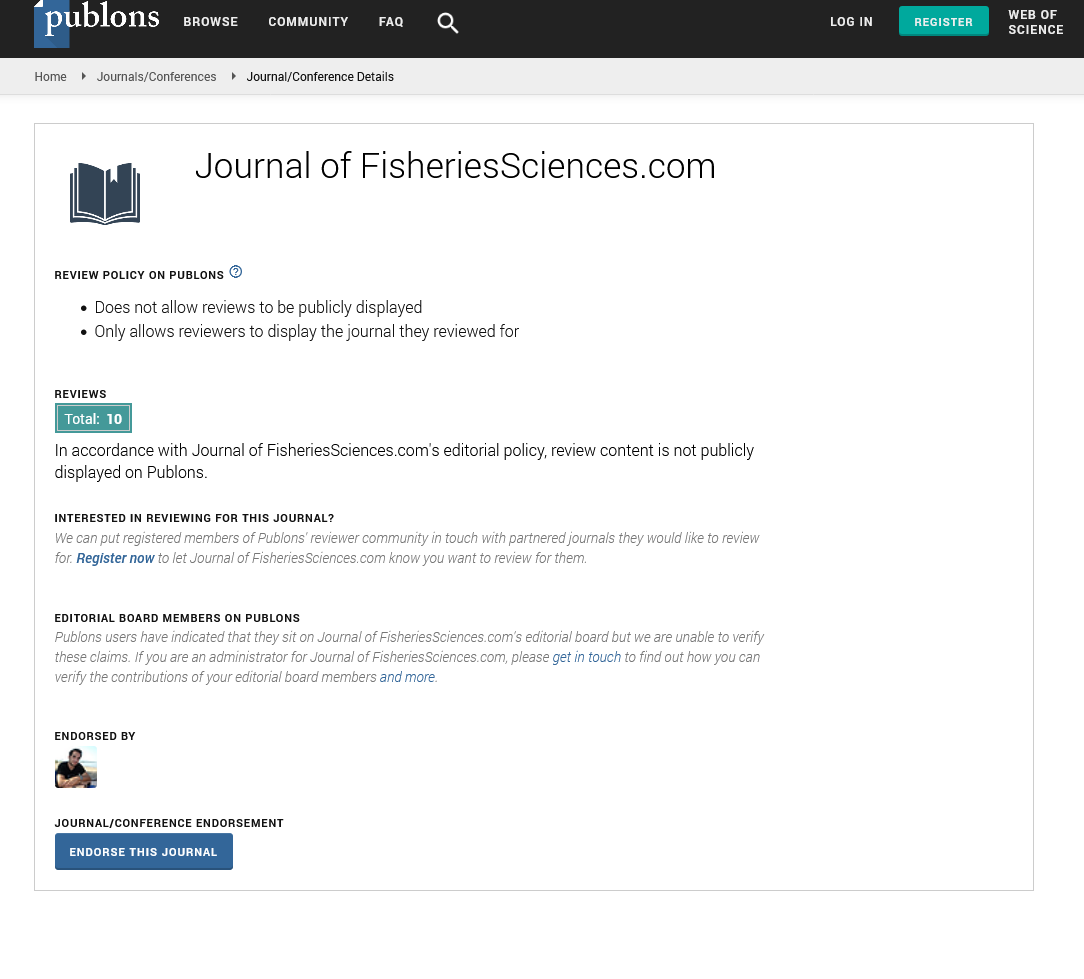Perspective - (2024) Volume 18, Issue 2
Navigating the Waters of Fishery Economics: Understanding the Economic Dynamics of Fisheries
Abdallah Shiomoto*
Department of Wildlife and Fisheries Management, Chatham University, China
*Correspondence:
Abdallah Shiomoto, Department of Wildlife and Fisheries Management, Chatham University,
China,
Email:
Received: 26-Mar-2024, Manuscript No. IPFS-24-14705;
Editor assigned: 28-Mar-2024, Pre QC No. IPFS-24-14705 (PQ);
Reviewed: 11-Apr-2024, QC No. IPFS-24-14705;
Revised: 18-Apr-2024, Manuscript No. IPFS-24-14705 (R);
Published:
26-Apr-2024
Introduction
In The world's fisheries play a crucial role in global food
security, providing a vital source of protein and livelihoods for
millions of people worldwide. However, the economic
sustainability of fisheries is often challenged by a complex
interplay of factors, including overfishing, environmental
degradation, and market dynamics. In this comprehensive
article, we delve into the intricate realm of fishery economics,
exploring the key concepts, challenges, and opportunities
shaping the economic dynamics of fisheries.
Foundations of fishery economics
Fishery economics is a branch of economics that focuses on
the economic aspects of fisheries management, resource
allocation, and market dynamics. Key concepts in fishery
economics include:
Resource economics: Resource economics examines the
economic principles governing the use and management of
fisheries resources. This includes the allocation of fishing rights,
the determination of optimal catch levels, and the design of
policies to promote sustainable resource use.
Market economics: Market economics explores the supply
and demand dynamics of fishery products, including factors
influencing market prices, trade flows, and consumer
preferences. Market analysis helps identify opportunities for
value-added processing, market diversification, and marketbased
conservation measures.
Cost-benefit analysis: Cost-benefit analysis is a tool used to
evaluate the economic efficiency of fisheries management
measures and investment projects. By comparing the costs and
benefits associated with alternative management options,
policymakers can make informed decisions about resource
allocation and prioritize interventions that maximize net social
welfare.
Economic incentives: Economic incentives, such as subsidies,
taxes, and payments for ecosystem services, play a critical role in
shaping the behavior of fishers and influencing fishing practices.
Understanding the economic drivers of fishing behavior is
essential for designing effective incentive-based conservation measures and reducing the negative impacts of fishing on marine
ecosystems.
Description
Challenges in fishery economics
Despite its importance, fishery economics faces numerous
challenges and complexities:
Over fishing: Overfishing is one of the most significant
challenges facing global fisheries, driven by excessive fishing
effort, technological advancements, and weak governance.
Overfishing depletes fish stocks, reduces ecosystem resilience,
and undermines the long-term sustainability of fisheries, posing
a threat to food security and livelihoods.
Externalities: Fisheries generate both positive and negative
externalities, such as ecosystem services, pollution, and habitat
destruction, which are not reflected in market prices. Failure to
account for these externalities can lead to inefficient resource
allocation, market failures, and the degradation of marine
ecosystems.
Uncertainty and risk: Fisheries are inherently uncertain and
subject to various sources of risk, including fluctuations in fish
stocks, environmental variability, and market volatility.
Managing fisheries in the face of uncertainty requires adaptive
management approaches, robust decision-making frameworks,
and the incorporation of risk assessments into fisheries
management plans.
Social equity: Fisheries management must balance economic
efficiency with social equity considerations, ensuring that the
benefits of fisheries are distributed equitably among stakeholders,
including small-scale fishers, indigenous communities, and
marginalized groups. Addressing issues of poverty, inequality, and
access to resources is essential for promoting social cohesion and
sustainable development in fishing communities.
Opportunities for sustainable fisheries
Despite these challenges, there are opportunities to promote
sustainable fisheries and enhance the economic resilience of
fishing communities:
Rights-based fisheries management: Rights-based fisheries
management, such as Individual Transferable Quotas (ITQs) and
community-based fisheries management, can align economic
incentives with conservation goals, promote stewardship, and
reduce the race to fish. By allocating secure fishing rights to
individuals or groups, rights-based management systems provide
incentives for long-term resource stewardship and investment in
sustainable fishing practices.
Eco-certification and market-based instruments: Ecocertification
schemes, such as the Marine Stewardship Council
(MSC) certification, can help incentivize sustainable fishing
practices by providing market premiums for certified products.
Similarly, market-based instruments, such as eco-labeling,
traceability systems, and certification schemes, can help
consumers make informed choices and reward producers who
adhere to sustainable fishing practices.
Integrated coastal management: Integrated coastal
management approaches, which consider the interconnectedness
of terrestrial, aquatic, and human systems, can help address the
complex socio-ecological challenges facing coastal fisheries. By
integrating fisheries management with coastal planning, habitat
conservation, and community development initiatives, integrated
management approaches can promote resilience, adaptability, and sustainability in coastal ecosystems.
Capacity building and governance reform: Strengthening
institutional capacity, improving governance frameworks, and
enhancing transparency and accountability are essential for
promoting sustainable fisheries management. Investing in
education, training, and technical assistance can build the
capacity of governments, fishers, and civil society organizations
to implement effective fisheries management measures,
monitor compliance, and enforce regulations.
Conclusion
In conclusion, fishery economics plays a critical role in shaping
the economic, social, and environmental sustainability of global
fisheries. By applying economic principles and tools to fisheries
management and policy, policymakers, researchers, and
stakeholders can promote sustainable resource use, enhance
economic resilience, and safeguard the livelihoods of fishing
communities. However, addressing the complex challenges
facing fisheries requires a multi-disciplinary approach, strong
political will, and collaboration among governments, industry,
civil society, and local communities. Through concerted efforts
and innovative solutions, we can chart a course towards a more
sustainable and equitable future for our fisheries and the
millions of people who depend on them for their livelihoods and
food security.
Citation: Shiomoto A (2024) Navigating the Waters of Fishery Economics: Understanding the Economic Dynamics of Fisheries. J Fish Sci Vol.18 No. 2






